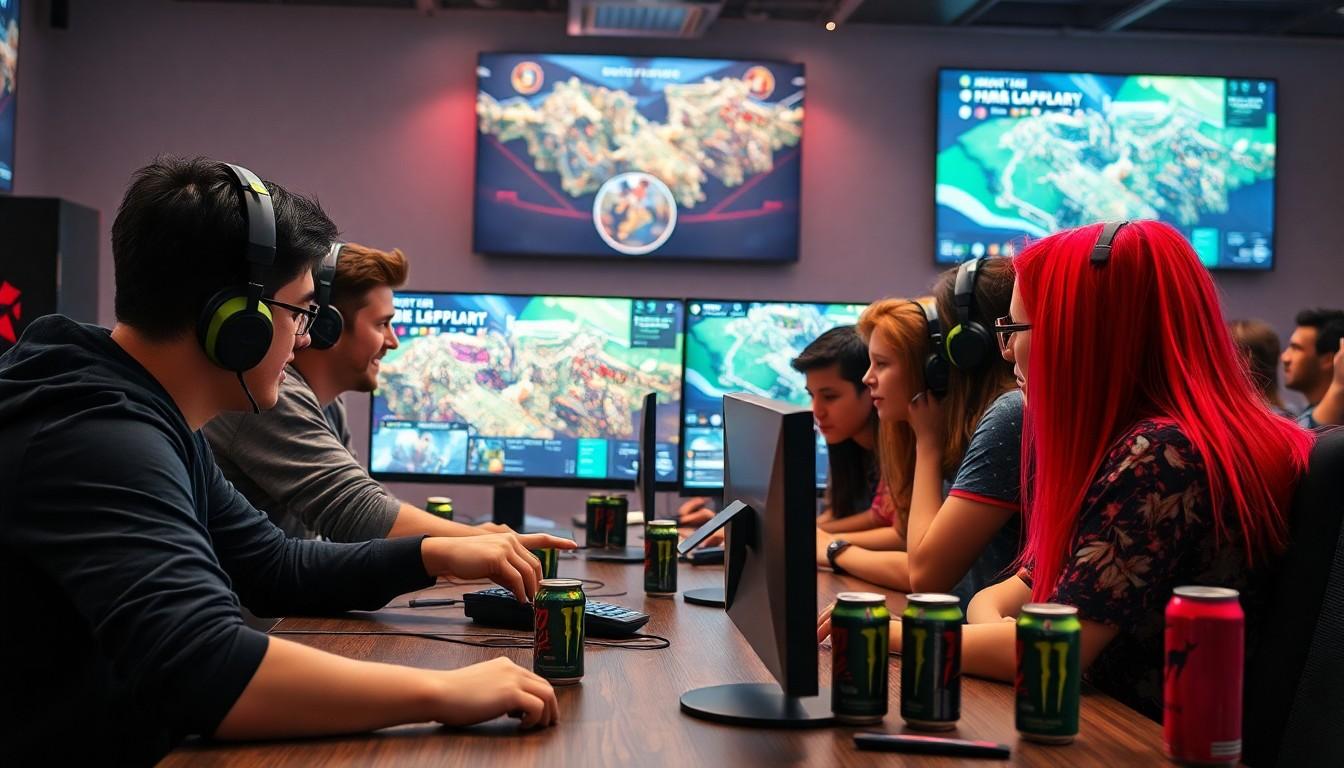Phone:
(701)814-6992
Physical address:
6296 Donnelly Plaza
Ratkeville, Bahamas.

In the fast-paced world of esports, strategies can make or break a team. Picture this: a group of players huddled around screens, fingers flying, sweat dripping, all while trying to outsmart opponents who are just as determined. It’s not just about reflexes; it’s about being three steps ahead, like a chess master who’s also a ninja.
Effective strategies play a pivotal role in achieving success in esports. Players must analyze their opponents’ behaviors and adapt their techniques accordingly. Preparation involves reviewing past matches, identifying weaknesses, and capitalizing on knowledge gained. Different game genres, such as first-person shooters, real-time strategy games, and multiplayer online battle arenas, require unique strategic approaches tailored to specific gameplay.
In first-person shooters, map control remains essential. Controlling high-traffic areas often leads to advantageous positioning for ambushes or sniper spots. Players prioritize communication with teammates to outline tactical plans and continuously gather information about enemy movements.
Real-time strategy games depend heavily on resource management. Players execute strategies involving base expansion and unit production. Adapting to the opponent’s build order influences decisions on which units to produce, allowing for counter-strategies that disrupt the enemy’s plans.
Multiplayer online battle arenas emphasize teamwork and character synergy. Understanding each character’s strengths and weaknesses allows players to formulate combinations that maximize effectiveness during battles. Positioning in team fights can determine victories; thus, coordinating ultimate abilities among teammates is crucial.
Overall, esoteric strategies encompass everything from individual decision-making to broader team tactics. Whether focusing on ambush setups, resource allocation, or strategic character selection, the ability to shift tactics as the game progresses remains invaluable. Mastery of these strategies distinguishes champions from competitors.

Successful strategies in esports hinge on several key elements that enhance gameplay and coordination. Mastering these components significantly boosts a team’s chances of victory.
Team composition defines the group of characters or roles chosen for each match. Selecting complementary abilities enhances synergy among players. A balanced mix of damage dealers, tanks, and support roles fits different situations. For example, in a multiplayer online battle arena, pairing characters with strong crowd control abilities alongside burst damage champions can create effective combinations. Additionally, understanding each player’s strengths ensures optimal performance. Adapting team composition based on the opposing team’s selections allows for strategic counterplays. Each choice impacts the overall strategy, making it crucial to analyze both team dynamics and enemy compositions.
Map control represents the strategic dominance over key areas in a game. Key positions often facilitate ambushes and vital resource acquisition. Players should prioritize holding advantageous spots to maximize visibility and influence. In first-person shooters, controlling high-ground locations enables effective engagement while minimizing exposure. Coordination among teammates is essential for maintaining control and executing tactical maneuvers. Recognizing when to engage or retreat based on map positioning significantly affects match outcomes. Furthermore, awareness of the enemy’s movements enhances tactical planning, contributing to overall success. Mastering map control provides a fundamental advantage, shaping the flow of the game.
Resource management involves the effective use of in-game assets like currency or units. Efficiently managing resources dictates the pace and progression of strategies. Players must focus on acquiring and evolving resources to maintain an edge. In real-time strategy games, prioritizing resource collection enables timely upgrades and unit production. Adjusting strategies based on resource availability is critical for executing counter-strategies. Understanding how to allocate resources, whether for offense or defense, often determines the match’s outcome. Balancing immediate needs with long-term goals creates a dynamic approach to gameplay. Proficient resource management fosters adaptability and responsive decision-making during matches.
Successful esports players implement strategies tailored to their game genre. Diverse games demand unique approaches to secure victory.
Multiplayer online battle arenas emphasize teamwork and character synergy. Players prioritize understanding each champion’s strengths to maximize effectiveness in combat. Coordinated efforts allow teams to execute ambushes and secure objectives. Map awareness drives strategic movements, influencing decision-making across engagements. Players constantly adapt strategies in response to opponents’ choices, adjusting character roles as needed.
Map control stands out as a key element in first-person shooters. Effective positioning creates opportunities for ambushes and surprise attacks. Players communicate vital information to their teammates, maintaining awareness of enemy movements. Tactical planning enhances team collaboration, allowing for coordinated assaults on objectives. Adaptability plays a crucial role when responding to enemy tactics, shifting strategies dynamically to outmaneuver opponents.
Battle royale strategies hinge on survival and resource acquisition. Players focus on loot management and positioning within the shrinking play area. Quick decision-making influences engagement, as encounters determine survival chances. Players must be clever in selecting the right moment to engage or retreat based on opponents’ strength. Tactical rotations around the map can secure advantageous situations while minimizing risks, making adaptability crucial in this genre.
Analyzing opponent strategies plays a critical role in esports success. Players must understand how their rivals approach the game to formulate effective counter-strategies.
Reading play styles involves observing opponents’ behaviors during matches. Players can identify unique patterns, preferred tactics, and popular character choices. Noticing aggressive behavior suggests opponents may exploit opportunities for ambushes. Conversely, defensive players may prioritize map control and positioning. This awareness allows teams to tailor their strategies, capitalizing on identified weaknesses. Reviewing recorded gameplay can help players grasp subtle nuances in opponents’ play, enhancing preparation for upcoming matches.
Adapting to opponent moves requires flexibility and quick decision-making. Players must recognize changes in enemy strategies on the fly. For instance, if an opponent shifts to a more aggressive stance, players need to counter with defensive tactics. Situational awareness aids in making informed choices when adjusting strategies mid-game. Additionally, effective communication with teammates ensures coordinated responses to opponents’ actions. Observing enemy movements closely enables teams to anticipate engagements, promoting a proactive approach to gameplay. Adjustments not only protect players but can also create openings for counter-attacks.
Mastering esports game strategies is essential for any player aiming for success. It’s not just about reflexes; it’s about understanding the game and opponents on a deeper level. Players who analyze their competition and adapt their tactics are more likely to come out on top.
Whether it’s executing perfect map control in first-person shooters or optimizing resource management in real-time strategy games, each element plays a crucial role. Teamwork and communication further enhance these strategies, allowing players to capitalize on their strengths while exploiting opponents’ weaknesses.
Ultimately, the ability to adapt and refine strategies as the game evolves sets the best players apart from the rest. Embracing this dynamic approach can lead to consistent victories and a deeper appreciation for the complexities of esports.